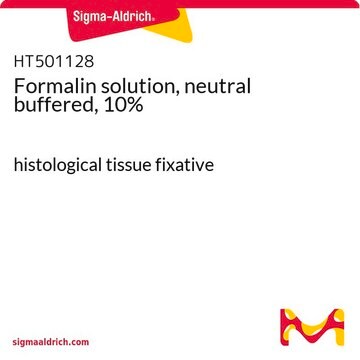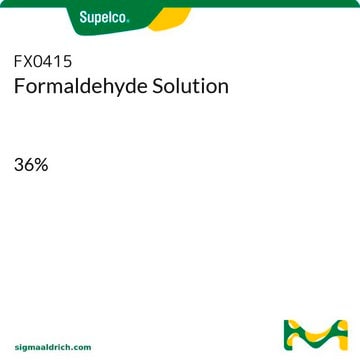47608
Formaldehído solution
for molecular biology, BioReagent, ≥36.0% in H2O (T)
Sinónimos:
Formalina
About This Item
Productos recomendados
grade
for molecular biology
Quality Level
vapor density
1.03 (vs air)
vapor pressure
52 mmHg ( 37 °C)
product line
BioReagent
form
liquid
autoignition temp.
572 °F
contains
~10% methanol as stabilizer
concentration
≥36.0% in H2O (T)
36.0-38.0% (aldehyde method)
technique(s)
electrophoresis: suitable
impurities
≤0.03% free acid (as HCOOH)
ign. residue
≤0.05% (as SO4)
pH
2.8-4.0
density
1.09 g/mL at 20 °C
1.09 g/mL at 25 °C (lit.)
anion traces
chloride (Cl-): ≤10 mg/kg
sulfate (SO42-): ≤20 mg/kg
cation traces
Ca: ≤5 mg/kg
Cd: ≤1 mg/kg
Co: ≤1 mg/kg
Cr: ≤1 mg/kg
Cu: ≤1 mg/kg
Fe: ≤1 mg/kg
K: ≤20 mg/kg
Mg: ≤1 mg/kg
Mn: ≤1 mg/kg
Na: ≤100 mg/kg
Ni: ≤1 mg/kg
Pb: ≤1 mg/kg
Zn: ≤1 mg/mL
λ
2 M in H2O
UV absorption
λ: 260 nm Amax: 0.01
λ: 280 nm Amax: 0.01
suitability
in accordance for electrophoresis of RNA in agarose gels
storage temp.
room temp
SMILES string
[H]C([H])=O
InChI
1S/CH2O/c1-2/h1H2
InChI key
WSFSSNUMVMOOMR-UHFFFAOYSA-N
¿Está buscando productos similares? Visita Guía de comparación de productos
General description
It is an aliphatic aldehyde that is widely used in industrial applications for the synthesis of several chemicals such as melamine formaldehyde, urea-formaldehyde, phenol formaldehyde and industrial resins, paraformaldehyde, polyols, chelating agents, slow release fertilizers, 1,4-butanediol and hexamethylenetetramine.
Application
- denaturation and separation of RNA molecules
- anti-bacterial treatment
- fixation of cells
- in the fixation of human spermatogonial stem cell transplantation (SSCT).
- to crosslink T- cell acute lymphoblastic leukemia protein/DNA complex during chromatin immunoprecipitation.
- in fixing zebra fish larvae for neutrophil staining.
Caution
Principle
Related product
signalword
Danger
Hazard Classifications
Acute Tox. 2 Inhalation - Acute Tox. 3 Dermal - Acute Tox. 3 Oral - Carc. 1B - Eye Dam. 1 - Flam. Liq. 3 - Muta. 2 - Skin Corr. 1B - Skin Sens. 1 - STOT SE 1 - STOT SE 3
target_organs
Eyes,Central nervous system, Respiratory system
Storage Class
3 - Flammable liquids
wgk_germany
WGK 3
flash_point_f
133.0 °F - closed cup
flash_point_c
56.11 °C - closed cup
ppe
Faceshields, Gloves, Goggles, type ABEK (EN14387) respirator filter
Certificados de análisis (COA)
Busque Certificados de análisis (COA) introduciendo el número de lote del producto. Los números de lote se encuentran en la etiqueta del producto después de las palabras «Lot» o «Batch»
¿Ya tiene este producto?
Encuentre la documentación para los productos que ha comprado recientemente en la Biblioteca de documentos.
Los clientes también vieron
Artículos
Millicell® hanging cell culture inserts for staining and microscopic analysis directly from the insert. Learn to utilize hanging cell culture inserts in barrier measurements.
Millicell® hanging cell culture inserts for staining and microscopic analysis directly from the insert. Learn to utilize hanging cell culture inserts in barrier measurements.
Millicell® hanging cell culture inserts for staining and microscopic analysis directly from the insert. Learn to utilize hanging cell culture inserts in barrier measurements.
Millicell® hanging cell culture inserts for staining and microscopic analysis directly from the insert. Learn to utilize hanging cell culture inserts in barrier measurements.
Nuestro equipo de científicos tiene experiencia en todas las áreas de investigación: Ciencias de la vida, Ciencia de los materiales, Síntesis química, Cromatografía, Analítica y muchas otras.
Póngase en contacto con el Servicio técnico












